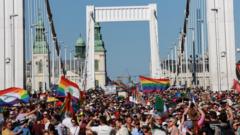Demands for a thorough investigation into police and military actions against protesters in Nairobi intensify, following emerging evidence from a recent BBC documentary.
Pressure on Kenyan Authorities Grows for Transparency After Police Killings Exposé

Pressure on Kenyan Authorities Grows for Transparency After Police Killings Exposé
Human rights advocates demand accountability following a BBC report on violent protests against tax hikes in Kenya.
Amid rising tensions in Kenya, prominent human rights organizations are escalating their calls for accountability after revelations of police violence against protesters during demonstrations against proposed tax hikes last June. A BBC Africa Eye investigation exposed the involvement of security forces in the deaths of three unarmed individuals at the Kenyan parliament, igniting public outrage and calls for a full inquiry into the events.
Organizations such as Amnesty International and the Kenya Human Rights Commission (KHRC) assert that officers implicated in the documentary should be brought before the law. The Kenyan government, however, has responded defensively, with spokesperson Isaac Mwaura emphasizing the importance of each life and criticizing the BBC for presenting a "one-sided" perspective. He claimed that the documentary failed to portray the full context of the protests, particularly highlighting damage to the parliament building without acknowledging who was responsible for it.
As this controversy unfolded, Members of Parliament debated the findings of the documentary, with accusations that it pushed a foreign agenda. MP John Kiarie criticized the BBC while fellow MP Millie Odhiambo underscored the necessity for a calm and sober response from the government, insisting that media cannot be stifled.
The police have distanced themselves from any self-investigation, redirecting the accountability to the Independent Policing Oversight Authority (IPOA). The Kenyan Defence Forces (KDF) have stated they have not seen any investigations concerning their personnel in these incidents.
The BBC's documentary, "Blood Parliament," detailed the tragic outcome of the protests on June 25, 2024, when lawmakers voted on a controversial finance bill poised to raise $2.7 billion. Using open-source data and an analysis of over 5,000 images, the BBC identified security personnel who are alleged to have opened fire, resulting in the deaths of three protesters. Amnesty International reported that the violent crackdown left at least 65 individuals dead, with more than 89 forcibly disappeared and thousands arrested. The Kenyan government, however, estimated a lower death toll of 42.
In a response to prevent the private screening of the documentary in Nairobi, the BBC expressed disappointment, while encouraging viewers to access it on their YouTube channel. Amnesty reiterated that the documentary underlined its prior findings that excessive lethal force was utilized against demonstrators and stressed the importance of transparency from the police and military regarding the issues raised in the exposé. The KHRC further claimed that "organised criminals in police and military uniforms" were sent to harm peaceful citizens, placing the responsibility on President William Ruto, who has been criticized for his previous defenses of police conduct.
Public anger has erupted online, with many demanding justice for the victims of police violence. As investigations by the IPOA continue, the authority reported that they are examining 60 deaths related to protests, with many involving gunshot wounds, while also documenting numerous injuries.
While some government officials warned that such documentaries could instigate violence, others, like Senator Edwin Sifuna, advocated for the necessity of confronting these narratives for the sake of truth in a bid for justice. As this situation continues to unfold, the priority remains on ensuring accountability and peace in Kenyan society.




















